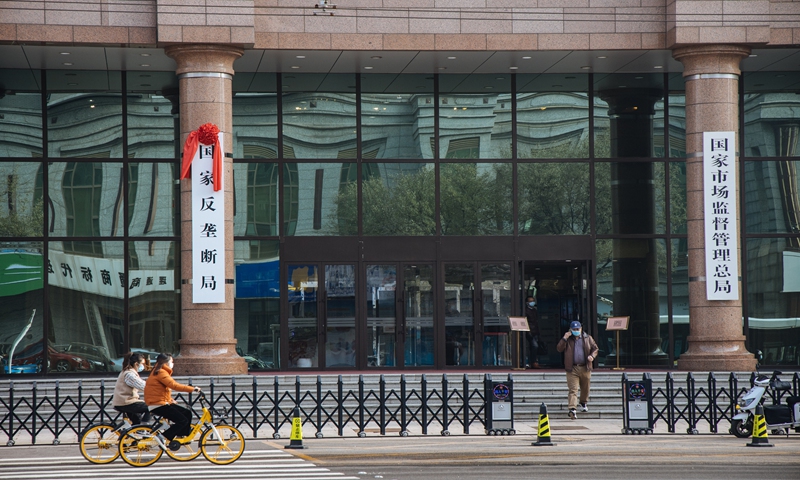
China's anti-monopoly bureau officially launches on November 18, 2021. It's located in the same building as the country's top market regulator, the State Administration of Market Regulation, in Beijing. Photo: Li Hao/GT
China's top market regulator on Monday hit online academic database China National Knowledge Infrastructure (CNKI) with a fine of 87.6 million yuan ($12.6 million), or 5 percent of its 2021 domestic sales revenue, for abusing its dominant market position.
The penalty, which wrapped up an antitrust probe that began in May, was hailed as a long-awaited decision to redirect the big name in China's online academic database networks away from years of abusing its market dominance, according to industry observers, noting that the result of the antitrust case will boost innovation and foster the sharing of knowledge and protection of intellectual property.
In a statement announcing the decision, the State Administration for Market Regulation (SAMR) said its antitrust probe found that CNKI has a dominant position in the domestic market for online database services focusing on Chinese-language academic papers. CNKI has abused its dominant position to monopolize the market since 2014, read the statement.
More specifically, CNKI has been selling its database services at exorbitant prices through continuous, large increases in service prices and indirect hikes from splitting databases. CNKI has signed exclusive cooperation agreements that prohibit academic journal publishers and universities from authorizing any other third parties to use academic journals, or doctoral and master's dissertations, among other academic papers.
CNKI has also used multiple rewards and penalties to ensure the implementation of exclusive partnerships, according to results of the SAMR probe. It concluded that CNKI used unfairly high prices, restricted transaction exclusions, limited market competition, infringed on users' legitimate rights and interests, and impacted concerned market innovation and development and academic exchanges, thereby constituting a violation of the country's Anti-Monopoly Law.
As a result, the online academic database was hit with an administrative penalty that mandates an end to its unlawful activities and a fine amounting to 5 percent of 1.75 billion yuan - its 2021 domestic sales revenue.
CNKI was urged to comprehensively implement an overhaul plan and eliminate the consequences of its violations.
In a posting on its WeChat account on Monday, CNKI said it earnestly accepted and resolutely obeyed the SAMR decision.
The online academic database made public its 15-point overhaul plan that includes terminating exclusive cooperation agreements, substantially lowering service prices, protecting authors' legitimate rights, and strengthening compliance and risk management.
The Monday announcement gave people long-awaited satisfaction, Zhang Hongbo, director-general of China Written Works Copyright Society (CWWCS), told the Global Times on Monday.
The database's monopoly of knowledge resources was built on its longtime infringement of the copyrighted works of a vast number of authors and intellectuals, Zhang said.
Without getting direct copyright permission from a multitude of authors and paying corresponding copyright fees, the database had been fast-tracked to its current monopoly, he continued.
The authorization of copyrighted works and fee payments were central to the 15-point rectification plan, the veteran copyright expert stressed. He expects expedited actions from CNKI to align itself with a push for the healthy development of knowledge papers platforms and accordingly flex its muscles in globalizing Chinese knowledge resources.
The SAMR decision removed a wall that obstructed the sharing of academic papers, especially in the technology sphere, Zhang Yi, CEO of iiMedia Research Institute, told the Global Times on Monday.
The penalty, after months of investigation, will hearten those devoting themselves to scientific and technological advances, said Zhang Yi.
The antitrust case served as a wake-up call regarding the double-edged sword the platform economy has been shown to be, Zhang Yi remarked, pointing to the rise of various platforms that offer users tremendous convenience, while exploiting the dominant market positions to the detriment of those users.
Also, a cybersecurity review was launched against CNKI in June. The database was reportedly holding "a huge amount of" personal information and important data in key industries such as national defense, telecommunications, transport, natural resources, health and finance, as well as other sensitive data covering major projects, important scientific and technological achievements, and key technological developments.
CNKI is one of the largest Chinese academic information gateway websites and has been known as almost the only authoritative platform for academic information in the country. It came under fire in April when the Chinese Academy of Sciences said it would suspend its use of CNKI due to high subscription fees.
The database has more than 1,600 institutional customers overseas across 60 countries and regions, in addition to 32,000 institutional customers from a variety of industries in the Chinese mainland, per its website introduction.
With over 200 million end-users and upwards of 16 million daily visits, it tallied 2.33 billion full-text downloads in 2021.
Among its core users are top universities, research institutes, government think tanks, enterprises, hospitals and public libraries, according to CNKI.




